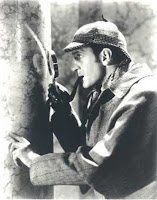Achieving Critical Distance from your Work
 Time to Investigate
Time to InvestigateThis, for me, is the Holy Grail of writing. We can all tell if someone else's writing isn't working; we can all tell when we love a piece, but turn our critical faculties to our own work, and we're either blinded by emotional involvement and love it, hate it completely, or perhaps worse, can't tell either way. It's not so much about murdering your darlings, but learning to look at them with the same appraising eye you look at other peoples'.
Just think, if you really could look at your work with genuine critical distance you really would be the best writer you could possibly be – you'd always know when it works and when it doesn't, what to fix and what to cut, what to refine, what to elaborate on and what to pare down.
You can learn to write better, you can learn to read like a writer – two skills that all the critical distance in the world will be no use without -but gaining critical distance - that's alchemy, right?
Mostly, yes – but here's a few tricks that can make it come a little easier.
Change the font
Crazy idea, but believe me it works – change the font to something else (sensible mind, dingbats is probably one defamiliarisation too far), reformat the paragraphs and line spacing – even use a different word processor – these techniques will really throw you out of a familiar space and make you look at what's behind the words i.e. the subject and meaning, rather than the words themselves.
Read it out loud
Or even better, record yourself doing it – and you probably want to do it in the most monotonous voice possible – this will really test your story, the cadence of your words – if they shine through that, you know you're onto something.
Reading out loud will also highlight ugly rhythm, clumsy phrasing, unpronounceable sentences etc. by the act of just doing it - this coupled with listening to your own voice massacring your text will have even the most purblind of authors scurrying to the edit table.
Invite criticism
I can't tell you the amount of times I've written something that burns with Prometheus's fire, that sparkles like rain, that cuts to the very heart of the universal human condition, only for it to be universally panned by everybody who reads it. Oh yes, it hurts, but believe me, you look again at that piece of work with a lot more distance that you did previously.
Put the manuscript away and live some life
Yes I know, the last thing you want to hear after spending five years on a manuscript it to put it away for some time and not think about it for (anything from 1 week to 6 months)
Abandon all hope or marry a genius
You could of course entirely rely on someone else's opinion - someone you completely trust - and make every change they recommend, every cut they suggest. I'm sure there's a few writers out there who use their spouses for just such a thing. I'm fairly confident that Percy Shelley used to pay attention to Mary's editorial suggestions, and I'm sure she did the same with his.


I get my daughter to read it. She's brilliant at telling me what doesn't work, and has no hesitation in doing so. She is almost always right.
ReplyDeleteHi James - yes I do indeed read mine aloud especially when a sentence seems tricky. However, i need to be alone otherwise i would receive complaints and strange looks from my family.
ReplyDeletei haven't found anyone to read it - so like you i'm on youwrite & some comments can really slice the heart - but i take them on the chin as they are mostly there to help.
I so endorse reading out loud. I've caught so many things doing this. Figured out pacing problems, word choices, typos, etc.
ReplyDeleteGreat list.
Reading out loud is a great trick, as is putting it away for awhile. I like your font idea...I will have to try it. This, to me, is the hardest part of writing! Why?
ReplyDeleteGreat ideas - I'd never thought of changing the font. Often I change the spellings of names, which rejuvenates them for me just enough to see the characters as new people who don't have the baggage of the ones I've been writing about.
ReplyDeleteAnd as for recording yourself in a monotonous voice...! Silly, but there's a good underlying point here. If I read a piece out loud, I can make up for the repetition by delivering it in a more animated way, as if to say 'I MEANT to write it like this, it's all in the performance!'
Gee, some writing activities are best kept totally private.